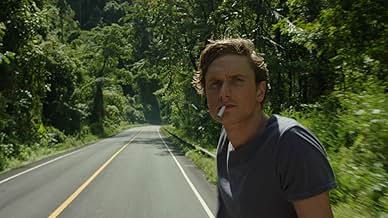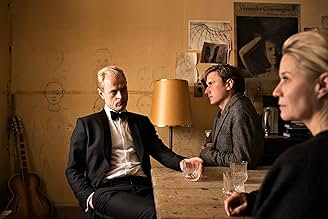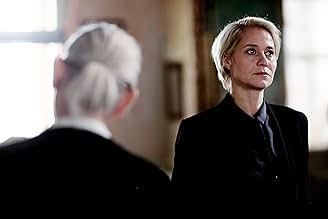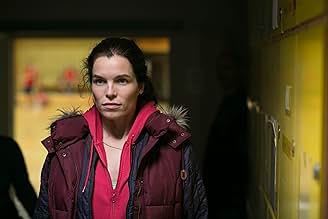La mort d'une matriarche dévoile des secrets oubliés et engendre un long conflit pour l'héritage familial.La mort d'une matriarche dévoile des secrets oubliés et engendre un long conflit pour l'héritage familial.La mort d'une matriarche dévoile des secrets oubliés et engendre un long conflit pour l'héritage familial.
- Récompenses
- 15 victoires et 7 nominations au total
Parcourir les épisodes
Avis à la une
Well there you have it: television as it should be. You do not see such apparently effortless perfection very often. Please do not wait for US remakes, treat yourself to the original! Very often, lead characters are well played, and you see some mediocre work here and there in the background. What strikes me with Arvingerne is that there is not a single instant where I can recall a glitch or less convincing acting. It is miraculous; where do children for example learn to act like that? The plot is a real actors' challenge, normal people turning into devils when a large inheritance seems to be coming their way, and back again into loving, good people when things settle down for a moment. Very often parties with loud music and dancing are hard to film, it is difficult to get a large cast of supporting actors to look like they are having fun. No problem for the Arvingerne crew! A special mention for Carsten Bjørnlund, playing the complex character of Frederik Grønnegaard. A very impressive performance indeed. There was for example one love scene where the point was that love at that juncture was awkward. I don't know how an actor is supposed to get that across, but he did, very movingly.
Signe Larsen, a young woman from relatively modest stock--working in a flower shop--discovers she was adopted and that her real family is a rich and decadent lot, fighting over the titular legacy of her recently deceased mother.
This sounds like a terribly worn out premise, but the writers actually succeed in transfiguring it by carefully avoiding the vulgar clichés we might expect: this is 'Dallas' alright, but 'Dallas' for the XXist century. The dead mother was not an oil magnate but a conceptual artist, the brothers and sisters are curators, lawyers and beach bums, all rather bohemian in their own privileged way. In place of gold watches and sports cars, we have conspicuous displays of cultural capitals (art books, white cubes and subdued designer dresses.) Behind this urbane and cultured façade, however, J. R. has nothing on any of them: Gro the curator dress her self-interest as selfless dedication to her mother's memory, Emil's devil-may-care altruism is fueled by privilege and self-indulgence, Thomas is perpetually escaping from his responsibility, and Frederik alone wears his stony heart on his sleeve.
The result is a populist Cinderella: Signe stands for honest work and common sense. Her decadent siblings, with their high-falutin modern culture and high-minded hypocrisy, are the fabled 'cosmopolitan elite'. But Avringerne is not *genuinely* populist: it is too well written, too well acted, too tastefully produced to appeal to the little man. Signe, pure as a lamb, perpetually turning the other cheek, is also the least compelling of the characters. This is a populist tale not for the little man but for the self-hating cosmopolitan elite.
The result is compelling: acutely observed, well cast, restrained and mostly credible. It does suffer from the failings of its soap opera model: as the episode count rises, the accumulation of peripeteia inevitably becomes less and less believable, so that by the end of the first season the viewer is already hard-pressed to suspend disbelief. By the end of the second, it has all become quite strained and repetitive. One wishes the writers had spread out their episode in time, avoiding thereby the artificiality of perpetual emergency and giving their characters time to grow.
This sounds like a terribly worn out premise, but the writers actually succeed in transfiguring it by carefully avoiding the vulgar clichés we might expect: this is 'Dallas' alright, but 'Dallas' for the XXist century. The dead mother was not an oil magnate but a conceptual artist, the brothers and sisters are curators, lawyers and beach bums, all rather bohemian in their own privileged way. In place of gold watches and sports cars, we have conspicuous displays of cultural capitals (art books, white cubes and subdued designer dresses.) Behind this urbane and cultured façade, however, J. R. has nothing on any of them: Gro the curator dress her self-interest as selfless dedication to her mother's memory, Emil's devil-may-care altruism is fueled by privilege and self-indulgence, Thomas is perpetually escaping from his responsibility, and Frederik alone wears his stony heart on his sleeve.
The result is a populist Cinderella: Signe stands for honest work and common sense. Her decadent siblings, with their high-falutin modern culture and high-minded hypocrisy, are the fabled 'cosmopolitan elite'. But Avringerne is not *genuinely* populist: it is too well written, too well acted, too tastefully produced to appeal to the little man. Signe, pure as a lamb, perpetually turning the other cheek, is also the least compelling of the characters. This is a populist tale not for the little man but for the self-hating cosmopolitan elite.
The result is compelling: acutely observed, well cast, restrained and mostly credible. It does suffer from the failings of its soap opera model: as the episode count rises, the accumulation of peripeteia inevitably becomes less and less believable, so that by the end of the first season the viewer is already hard-pressed to suspend disbelief. By the end of the second, it has all become quite strained and repetitive. One wishes the writers had spread out their episode in time, avoiding thereby the artificiality of perpetual emergency and giving their characters time to grow.
10jmr7123
With programs like Forbrydelsen and Borgen, Danmarks Radio has secured an international reputation as a powerhouse for serial drama, and this continues in spades with Arvingerne. Writing, acting, directing, etc., all show a level of artistic merit that puts the great majority of UK and American shows to shame (that's why BBC rebroadcasts them and US networks like AMC make crappy remakes). This is a new genre choice, however: the dynastic family drama, centering on the four squabbling children of a hippie artist mother from the sixties. I binge-watched it in 3 days, something very rare for me. In particular, Carsten Bjørnlund, a Forbrydelsen alum, is brilliant in the role of deeply damaged son Frederik, but all the principals are compelling. Just beginning to be available, in various ways, with English subtitles, but definitely worth seeking out.
Do see this! For all of the millions of people out there whose entire lives have been molded by selfish parents who lost their common sense somewhere between a kiss and the diamond ring, here's a soap opera for you. The two main female roles are portrayed very convincingly, notably Trine Dyrholm as "Gro Grønnegaard" and Marie Bach Hansen as "Signe Larsen". The plot quickly thickens as the question of inheritance brings out the weasel in just about everyone. Psychologically, anyone who has ever dealt with inheritance issues will recognize several themes and reflect on their own personal stories and reactions. As a result maybe this defining drama can pave the way for deeper family dialogs among the lucky viewers who have the guts to speak up.
It is difficult to not give this series a 10, but one always imagines something can be better. In this story, set in Funen, the island of Hans Christian Anderson, a family encounters itself in all its complex, passionate, devious depths. The writer Maya Ilsøe is superb -- fascinating concerns with truth and lie, with nature and art, with the truth about fathers and mothers, and the deviations of children who have to live with their lies.
The tale is sensitively brought to our eyes by intelligent actors and producers. I have long been a fan of Danish TV, and this lives up to the best of it. Hoping for a strong 3rd season, which I understand will be the last.
The tale is sensitively brought to our eyes by intelligent actors and producers. I have long been a fan of Danish TV, and this lives up to the best of it. Hoping for a strong 3rd season, which I understand will be the last.
Le saviez-vous
- AnecdotesArvingerne was sold to a number of other countries worldwide even before it had aired in Denmark.
- ConnexionsReferenced in Gintberg på kanten: DR (2015)
Meilleurs choix
Connectez-vous pour évaluer et suivre la liste de favoris afin de recevoir des recommandations personnalisées
- How many seasons does The Legacy have?Alimenté par Alexa
Détails
- Date de sortie
- Pays d’origine
- Sites officiels
- Langues
- Aussi connu sous le nom de
- The Legacy
- Lieux de tournage
- Langkildegaard, Svendborg, Fyn, Danemark(as Grønnegaarden)
- Sociétés de production
- Voir plus de crédits d'entreprise sur IMDbPro
Contribuer à cette page
Suggérer une modification ou ajouter du contenu manquant

Lacune principale
By what name was Les héritiers (2014) officially released in India in English?
Répondre
![Regarder Trailer - Season 1 [OV]](https://m.media-amazon.com/images/M/MV5BNTZlZTA0NjktNmVkMi00N2Y4LTk1YzUtMjU0MjRmN2RlNDAyXkEyXkFqcGdeQXRyYW5zY29kZS13b3JrZmxvdw@@._V1_QL75_UX500_CR0)



























